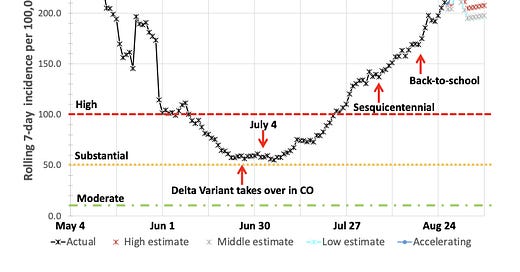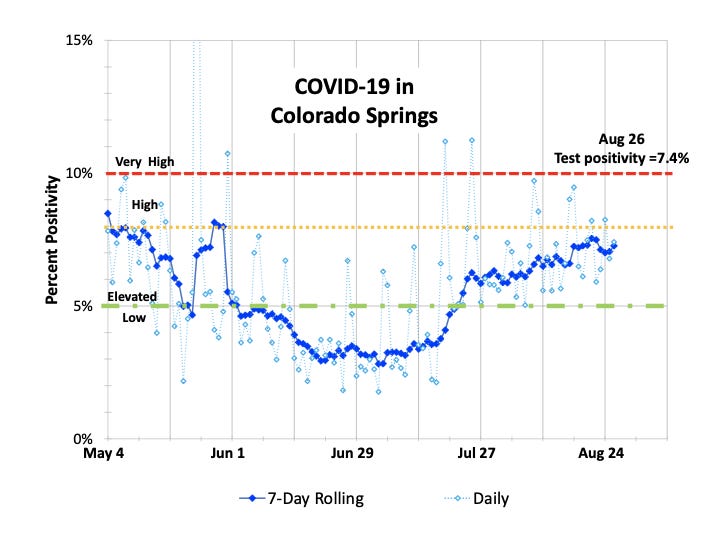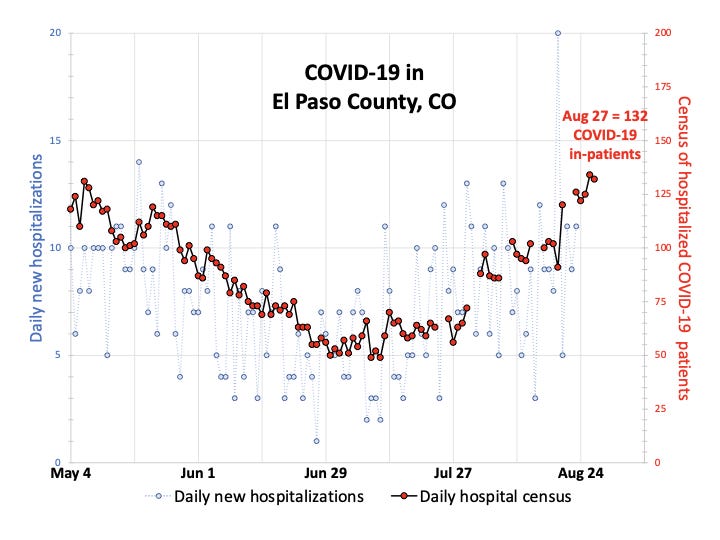COVID-19 Forecast for El Paso County — Aug. 30
Plus, our resident microbiologist on COVID-19 booster shots
Good morning, and happy First Monday! The CC COVID-19 Reporting Project is so excited to be in-person once again and start a, hopefully, more normal year. On that note, we are announcing a pause from publishing for the time being. Thanks to all the dedicated readers for all the support over the last year and a half and for following along as we bring updates to how this pandemic has impacted the CC community.
Today, Phoebe Lostroh returns to give her weekly COVID-19 forecast for El Paso County and to explain COVID-19 booster shots. Lostroh is a professor of molecular biology at Colorado College on scholarly leave who is serving as the program director in Genetic Mechanisms, Molecular and Cellular Biosciences at the National Science Foundation.
➡️ICYMI: On Monday, Phoebe Lostroh returned to give her weekly forecast. Also, we explained how NSO would look like for this year.
✉️In Your Inbox:
On Monday, Aug. 16, President L. Song Richardson sent out a message about the creation of the COVID-19 Policy and Implementation Committee to assist in creating policies surrounding COVID-19.
Also on Monday, Aug. 16, CC Communications sent out an email announcing the arrival of new students to campus for orientation along with some information regarding the event.
On Thursday, Aug. 19, Senior Vice President for Finance and Administration, Robert G. Moore, announced Eric E. Lee as the new assistant vice president of diversity, equity, and inclusion.
On Monday, Aug. 23, the Office of Communications sent out a message about Opening Convocation. It is today on Tava Quad at 9 a.m. and it will mark CC’s 148th academic year.
On Tuesday, Aug. 24, a faculty member working in Armstrong Hall and a child at the CC Children’s Center received positive test results and CC has conducted contact tracing.
On Thursday, Aug. 26, Chief Public Health Advisor to the President Andrea Bruder and Chair for the COVID-19 Policy and Implementation Committee Mateo Muñoz announced what you need to know about the COVID-19 Response Plan.
On Sunday, Aug. 29, a student living off campus received a positive test result. They were in Rastal Dining Hall on Saturday.
Phoebe’s Forecasts
NOTES: These forecasts represent her own opinion and not necessarily those of the National Science Foundation or Colorado College. She used the public El Paso County dashboard for all data. Lostroh prepared these forecasts on Aug. 28.
⚖️ How her predictions last week shaped up: Aug. 28 is the last day of Morbidity and Mortality Weekly Report week 34 in the national public health calendar. It is the 77th week since the first case was detected in El Paso County. Since March 13, 933 El Paso County residents have died of COVID-19. Last week, Lostroh predicted between 2,551 and 3,190 new cases in El Paso County for the week ending Aug. 26. There were actually 2,808 cases. For the week ending Sept. 9, Lostroh predicts 2,988-3,825 new cases in El Paso County.
Rolling seven-day cumulative incidence in El Paso County with predictions
🗝️ Key points: The actual calculated incidence is in black Xs, while the red, grey, and light blue symbols provide estimates based on curve-fitting for the most recent 21, 14, and seven days, respectively. The accelerating estimate, using the increasing rate of new cases in the most recent two weeks, is in medium blue. The green, yellow, and red-dotted lines show the CDC’s thresholds for risk categories. As of Aug. 29, the incidence per 100,000 people in El Paso County was 203.
“The incidence has been rising since about two weeks after the delta variant took over the population of viruses in Colorado,” Lostroh said.
Seven-day rolling percent positivity compared with daily percent positivity in El Paso County
🗝️ Key points: The seven-day rolling percent positivity for nasopharyngeal tests for viral nucleic acids is plotted in dark blue diamonds, while the daily percent positivity is plotted in open light blue diamonds. As of Aug. 29, the percent positivity in El Paso County was 7.73%.
New COVID-19 hospitalizations compared with the regional census of hospitalized COVID-19 patients
🗝️ Key points: Daily hospitalizations are plotted in blue using the left-hand axis, while the census of regional hospitalized COVID-19 patients is plotted in red on the right-hand axis. As of Aug. 29, the seven-day average daily hospital admissions in El Paso County was at 9.57 admissions.
“The regional census of COVID-19 inpatients is higher than one week ago and in the ‘concern’ orange range on the county’s data dashboard,” Lostroh said. “We do not have access to information about Children’s Hospitals in particular but the county dashboard says that three children under the age of nine were hospitalized for COVID-19 in the most recent two weeks.”
Q-and-A with Lostroh: Our resident microbiologist on the FDA approved Pfizer vaccine.
This interview has been edited for length and clarity.
CC COVID-19 Reporting Project: The Pfizer vaccine was officially approved by the U.S. Food and Drug Administration. To what extent do you think this approval will affect vaccination rates and what does it mean to be an FDA approved vaccine?
Lostroh: So, this means the Pfizer vaccine has full approval. It’s no longer an emergency use authorization, rather it’s approved to the extent that any other drug or vaccine is approved, which means that it has a good safety profile and high efficacy. They collect a lot of data to show that with a variety of different kinds of people – so women and men, younger people, older people, children, etc. I’m not anticipating a giant rush for vaccination in El Paso County, certainly, we aren't seeing a big rush toward the vaccine opportunities. The amount is pretty much flat, slightly higher than it was in July, but it’s flat. So that says we need to get more vaccinations, going in El Paso County but I don’t think that approval of the vaccine by the FDA is gonna change people’s opinions very much.
CCRP: Pfizer is now working towards getting a booster shot FDA approved. To what extent do you think that everyone will need to get a booster shoot and why would it be necessary?
Lostroh: We are in a situation now where the virus is replicating pretty much unchecked in many places in the world. We happen to live in a country that has access to vaccines so the replication of the virus is a little bit slower, at least among vaccinated populations. So, I think that the virus is going to continue to evolve whenever it has the chance to replicate and I think that we’re probably going to get to a point where there are emerging variants that can evade the immune response provoked by the original vaccines. At that point, everyone will need to get some kind of booster that’s slightly different, that reflects those changes to the spike protein that have accumulated since the vaccine was originally developed. I’m kind of surprised that we haven’t been hearing more about that in the news, like for instance incorporating the Delta type spike protein into the mRNA vaccines instead of the ancestor. So far, I haven’t heard that anyone’s intending to do that but that kind of thing could come up that could start to happen.
CCRP: As of now, there is a booster shot that is available under emergency use authorization. What group of people can and should receive this shot right now?
Lostroh: Yeah, that’s a really good question and I would say that they are leaving it up to individual physicians to determine whether or not their patient has a weakened immune system. If they do, they will recommend them for vaccination. For example, someone who has some kind of blood cancer and is being treated for that cancer might have very low white blood cell counts, and might have sort of dysregulated antibody and T-cell responses because of the medication that they’re on, or other people who are taking chronic immunosuppressive drugs for because they've had a transplant or something similar. For the most part, I would think we’re going to see those doses going to cancer patients and people with autoimmune diseases, or some kind of transplant history, and then it remains to be seen whether we will see that made generalizable to the entire population. I know that there’s active studies going on right now to monitor how much antibody stays in somebody’s blood at every interval since the vaccination, so we’re getting that data, but we’re trying to make decisions not having all the data yet, so we have to wait until the data come in a little bit longer before we know if everybody needs a booster shot.
A previous version of this story mispelled Drew Cavin’s name. We regret the error.
About the CC COVID-19 Reporting Project
The CC COVID-19 Reporting Project is created by Colorado College student journalists Cameron Howell, Will Taylor, and Ellie Gober in partnership with The Catalyst, Colorado College’s student newspaper. Work by Phoebe Lostroh, Associate Professor of Molecular Biology at CC and National Science Foundation Program Director in Genetic Mechanisms, Molecular and Cellular Biosciences, will appear from time to time.
The project seeks to provide frequent updates about CC and other higher education institutions during the pandemic by providing original reporting, analysis, interviews with campus leaders, and context about what state and national headlines mean for the CC community.
📬 Enter your email address to subscribe and get the newsletter in your inbox each time it comes out. You can reach us with questions, feedback, or news tips by emailing ccreportingproject@gmail.com.





